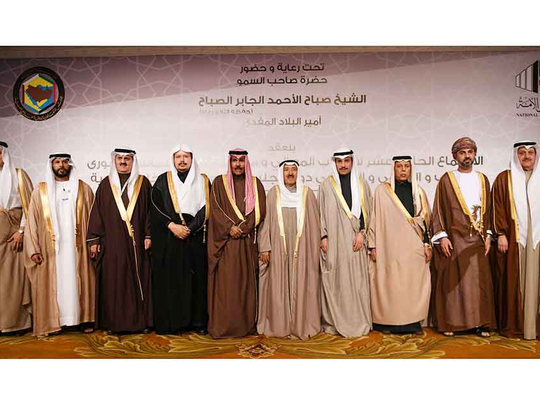
Manama: Kuwait’s Emir Shaikh Sabah Al Ahmad Al Jaber Al Sabah has stressed the need of cooperation between the Gulf Cooperation Council (GCC) states to face growing threats and challenges.
“We are all aware of the conditions around us, and unfortunately, and of their deterioration that represent a serious challenge to us all,” Shaikh Sabah said as he opened the 11th meeting of Chairpersons and Speakers of the GCC Shura, representative councils and national assemblies in Kuwait City on Monday.
“The situation is compounded with the obstacles on our GCC forward-looking progress, and this demands that we cooperate, consult and meet at all levels. We cannot confront these challenges individually. Collective work is our way ahead in the confrontation and the best way to protect us to deal with the challenges and to preserve the achievements of our people and countries.”
Shaikh Sabah highlighted the important decisions taken at the 38th GCC Summit hosted by Kuwait in December and which brought together the six members – Bahrain, Kuwait, Oman, Qatar, Saudi Arabia and the United Arab Emirates for the first time since a major crisis broke out within the alliance in June.
Bahrain, Saudi Arabia and the UAE severed their diplomatic relations with Qatar after they accused it of supporting extremists and funding terrorism.
Kuwait has led mediation efforts to bridge the gap between the two sides, but no success or incremental breakthrough has been achieved so far.
In his speech, Shaikh Sabah expressed his joy over hosting the 23rd Football Gulf Cup for that concluded on Friday.
The Kuwaiti leader said that such events brought GCC citizens closer together.
He added that the GCC leaders had the responsibility to meet the needs and fulfill the hopes of their people by cooperating with one another to set a road map for development, amidst a multitude of growing challenges in the region.
The GCC states had accomplished prominent achievements in the last four decades in representing the Gulf region on an international level, Shaikh Sabah added, Kuwait News Agency (Kuna) reported.
However, parliaments and people’s councils should also contribute decisively, he said.
“Your role as representatives of the citizens of the GCC states is vital, constructive and complementary to the role of the official bodies in our countries. You are the legislative body in our countries, which helps to map out the way ahead for development, construction and communication under these delicate circumstances that demand full awareness of their dimensions and risks. Our people look forward with great hope to such meetings to fulfill their aspirations for stability, prosperity and development. What brings us together is far too important to be impacted negatively by a difference no matter how long it lasts,” Shaikh Sabah said.











